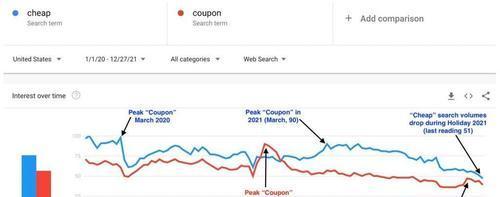Financial Associated Press (Shanghai, editor Xiaoxiang) news, in recent months, the US inflation data continues to explode. Data released by the Labor Department earlier this month showed that the U.S. CPI rose 6.8 percent year-on-year in November, the highest level since 1982. However, a study by Nicholas Colas, founder of independent research firm DataTrek Research, found a strange phenomenon — while U.S. price levels are accelerating, U.S. consumers are searching the Internet for words like "cheap," "coupon," and "discount."
Citing Google Trends data, DataTrek lists searches for the terms "cheap" and "coupon" since January 2020.

As shown in the chart above, searches for the word "cheap" peaked at the beginning of the pandemic (March 2020). As U.S. inflation began to emerge, searches for the term again reached similarly high levels in March. Since then, however, searches for "cheap" have dropped by nearly 50 percent. Even the holiday shopping season can't get consumers interested in low-priced gifts.
The search volume for the word "coupon", including any form of online coupon, also looks similar to the trend of "cheap". Searches for the word "coupon" peaked around the 2020 holiday season, but searches during the 2021 holiday season were only half as many as they were then.
In addition, Colas looked at searches for the term "discount" by U.S. netizens over the past two years. The peak occurred during last year's Black Friday shopping festival, but this year's Black Friday search volume fell by 21% year-on-year. In the last week of November, "discount" searches hit a two-year low.
Colas took two takeaways from the search changes described above:
Implications: While it's true that U.S. consumers may seriously consider inflation (as evidenced by many recent surveys), they haven't taken real action to find cheaper goods to deal with current higher prices.
Colas believes that the decline in search volume above may have the following reasons. First, Google Trend Data is a summary of what makes sense to think that a reduction in searches for cheap goods and services is justified as overall U.S. employment/wage growth improves in 2021. In addition, job/wage growth has made it easier for consumers to afford higher prices, and they may not think it's necessary to search online for words like "cheap," "coupon," and "discount" at this time.
Implications: This is good news for U.S. corporate profitability, especially for large companies that enjoy both economies of scale and scope (i.e., efficiencies formed by variety rather than quantity).
Colas notes that "consumers may complain about inflation, but their buying habits don't seem to have changed much." This allows these companies to pass on costs through price increases, maintaining profit margins and returns on capital. While we don't think this will last forever, it is likely to continue at the beginning of 2022. ”